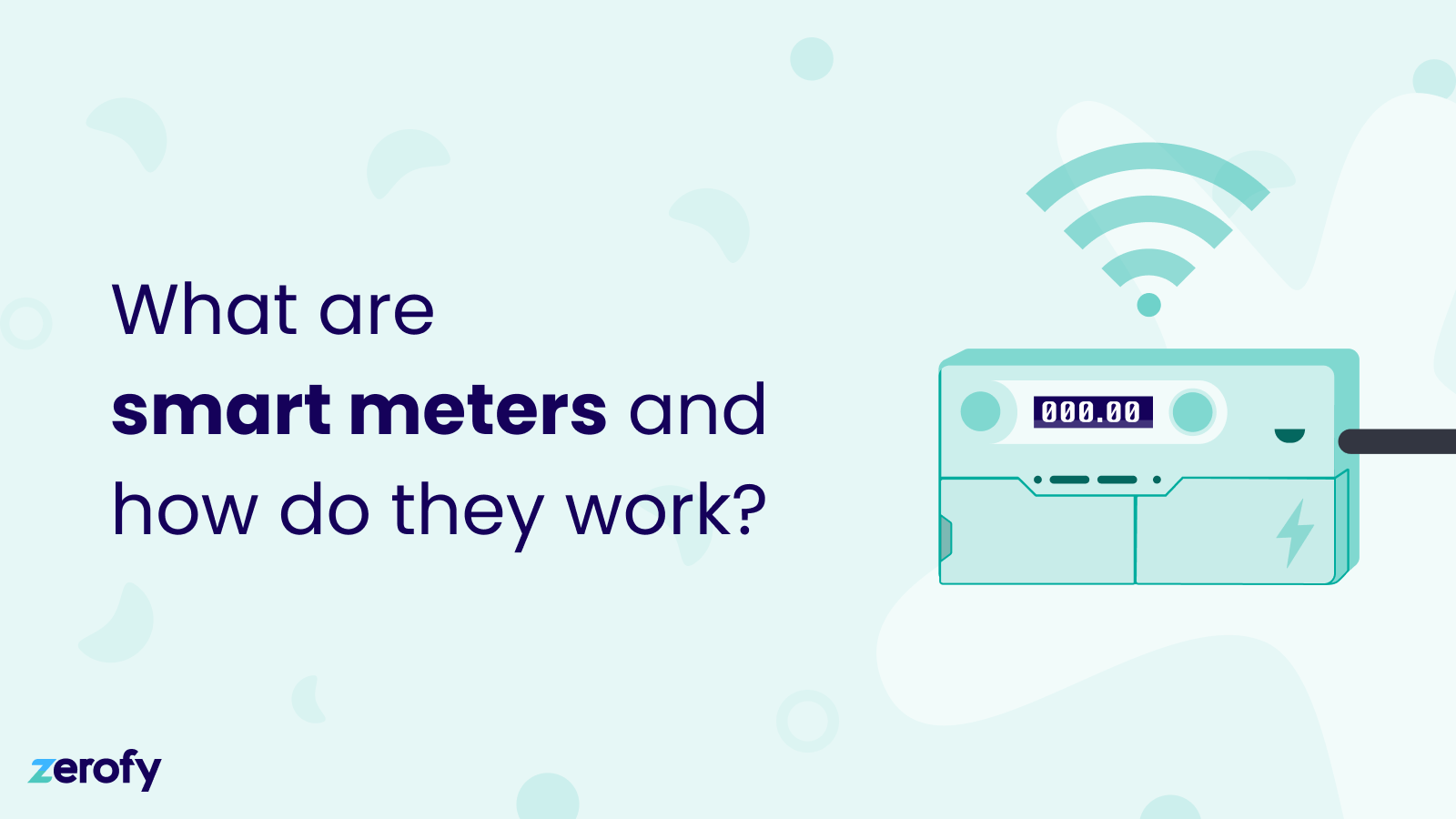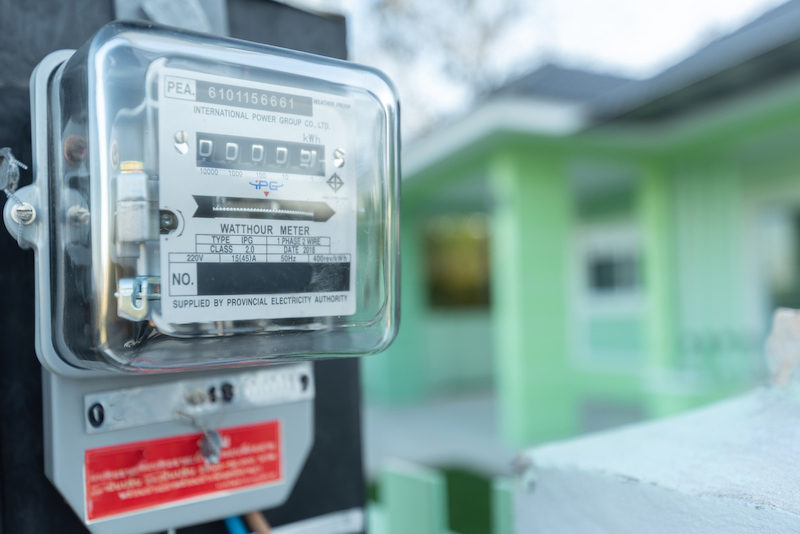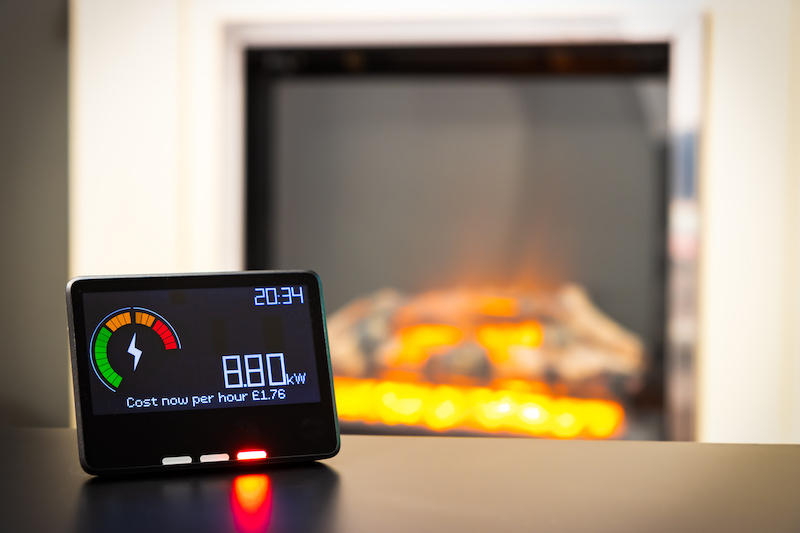
What is a smart meter?
A conventional meter logs how much electricity and gas a household or business uses. They are usually read out manually by your utility company (for example monthly, or in some cases even only twice a year), which is then used to calculate your bill. A smart meter is similar in that it logs energy use. It differs significantly however, in the insights and data it can provide. A smart meter is an electronic device that records the electricity use of your household and can store and transmit it digitally (for example to your utility company). Some smart meters also enable two-way communication.
 A conventional meter.
A conventional meter.
A key benefit of smart meters is that customers can get more timely and granular information on their electricity use. This can be enabled through an in-home display (common for example in the UK), which displays metering data in the home. Or it can be enabled through a web app or mobile app provided by your utility or third parties. Generally, smart-meter regulation requires that end-users have direct access to their (smart) metering data. For example, in Europe, the data collected via smart meters is considered personal data and therefore covered under GDPR, which means consumers must be able to view their data (Sources: Open Energy, Science Direct).
Smart meter use has been growing across the globe. Berg Insights reports that close to 45% of electricity customers in Europe have one, and 60% in North America. They predict that by 2025, 280.4 million units will be in use in Europe (Source: Smart Energy International).
 A in-home display for a smart-meter.
A in-home display for a smart-meter.
What are the benefits of using a smart meter?
Understand your energy usage and reduce household CO2 emissions
One of the main benefits of smart meters is that they can give energy consumers close to real-time feedback and insight on their energy consumption. Then, consumers can make choices with this information to better manage their usage to save energy and reduce emissions (Source: European Commission).
The near real-time and precise data on energy usage provided by your smart meter can empower you to take action. For example, if you notice your usage is especially high during the afternoons, you can use that information to evaluate steps you can take to reduce, like turning off lights not in use, unplugging unused appliances, and air-drying your laundry. By reducing your consumption, you’ll in turn reduce the CO2 emissions associated with your household. A 2019 report stated that smart meters will contribute to a 25% reduction in household CO2 emissions by 2035, compared to 2015 levels (Source: Delta Energy & Environment).
Learn more ways to reduce household CO2
Save money on electricity and gas bills
Smart meters can help your household make more informed decisions that can save you money. By measuring and recording your consumption in near-real-time (e.g. every 15 minutes), smart meters enable dynamic pricing tariffs, where the price of electricity changes hourly. With such a tariff and the associated real-time price information, you can choose to do more energy-intensive activities, like charging your electric vehicle, when the price is lower. This can be done manually or automated. This wouldn’t be possible with a traditional meter. The actions you take to reduce your consumption, mentioned in the above section, can also mean a lower bill. The UK government reports that consumers using smart meters have seen sustained 3% savings on their electricity bills, and 2.2% on their gas bills (Source: UK Government).
When it comes to your monthly bill, smart meters allow you to keep track of what you have used all the way through the billing period. This means that you won’t be estimating what your bill is each month. For budgeting purposes, this is very valuable. It also means you won’t experience getting a bill that is much higher than expected, and wonder how that happened. You can use your digital display to look at how your electricity consumption changed day-over-day over the course of the month.
More control for consumers who also produce energy
Some consumers occupy both the role of energy consumer and producer. These are households that produce renewable energy, for example, via solar panels on their roof. Smart meters present an opportunity for these households to have precise control over when they consume and when they store what they produce. Plus, they can give them control over when they choose to sell what they produce to the grid and earn revenue (Source: Smart Choice Metering).
Contribute to a smarter energy grid
By using a smart meter, your household can contribute to a smarter and more efficient grid. You can think of it like improving communication between two entities: you, the household, and the energy supplier. When consumers use smart meters, it gives the utility companies or suppliers a lot more insight and detail than was possible in the past. This means that they can observe grid demand more accurately, making them better equipped to match demand. This can lead to a more balanced and efficient grid. Smart grids mean less energy wasted, as well as cost savings, which can be passed onto the consumer (Source: Smart Choice Metering). For energy consumers who also produce energy, above, smart grids bring the potential for them to respond to the current prices and sell their excess energy back to the grid (Source: European Commission).
How do smart meters work with Zerofy?
If your provider is supported, you can connect your smart meter to the Zerofy app! This means that your energy use will be visible right in the app, in granular detail. Your household carbon footprint will be even more accurate, allowing you to make the most informed decisions and take action towards reducing it.
At the moment, Zerofy supports smart meter devices by Smart-Me, as well as nationwide platforms Energinet in Denmark, and most smart meters in the UK. We are working to support more providers in the near future. If your provider isn’t included and you’d like to increase the chances of having yours added, request a Zerofy smart home integration.
Related reading
Always know when your electricity is green—and cheap
Smart-me INtegration in Zerofy
Sources:
[1] Smart Choice Metering. https://smartchoicemetering.co.uk/understanding-the-smart-grid/
[2] Smart Energy International. https://www.smart-energy.com/industry-sectors/smart-meters/managed-smart-metering-services-to-thrive/
[3] UK Government. https://www.gov.uk/government/publications/energy-security-bill-factsheets/energy-security-bill-factsheet-smart-metering
[4] Delta Energy & Environment. https://www.smartenergygb.org/media/i0pjpsqm/smart-meter-benefits-climate-change.pdf
[5] European Commission. https://energy.ec.europa.eu/topics/markets-and-consumers/smart-grids-and-meters_en
[6] Open Energy. https://energy.icebreakerone.org/data-protection-and-smart-meter-data/#:~:text=GDPR%20applies%20to%20any%20use,meter’%20is%20considered%20personal%20data.
[7] Science Direct. https://www.sciencedirect.com/science/article/pii/S0957178721000229